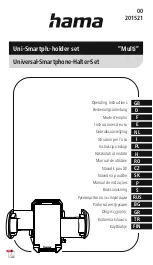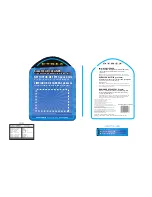
Troubleshooting
Manual_Grid_Power_FNC_en_V3_0
52
11.
Troubleshooting
11.1.
Over Consumption of Distilled Water
During charging, electrolysis decomposes the water of the electrolyte into the gases 2H
2
+
O
2
. This leads to a lowering of the electrolyte level. The volume of decomposed water
depends on charging voltage, charging time per day and temperature.
If you detect an over consumption of distilled water, proceed as follows:
Possible Cause
Remedy
Charging voltage is too high.
Check the charger.
Dispersion of the individual cell voltages.
See next chapter.
11.2.
Dispersion of the Individual Cell Voltages
If you detect that the individual cell voltages show variations of more than ±50 mV from the
mean of all cell voltages, proceed as follows:
Possible Cause
Remedy
Variations in cell temperature.
Check the ventilation.
Differences in the electrolyte density of the
cells.
The equalization must be performed by
HOPPECKE service.
Plate short-circuits in one or more cells.
Measure the individual cell voltages.
Change the defect cell(s).
Various charge states of the cells.
Run a reconditioning charge.
Insulation resistance is too low
11.4 Insulation Resistance is Low
11.3.
Available Battery Capacity is Low
Insufficient capacity may be due to the following causes:
Possible Cause
Remedy
Boost charging process is too short.
Run a reconditioning charge.
Electrolyte levels are below minimum level. Correct the electrolyte level.
Loose or oxidised terminals.
Control all connections, change
connectors if necessary (use new spring
washers)
Insulation resistance is too low
11.4 Insulation Resistance is Low.
11.4.
Insulation Resistance is Low
Definition:
Minimum insulation resistance = 100 Ω x 1.2 V x number of FNC
®
cells
In case of an insulation fault, leakage currents may reduce the available capacity of the
battery. This runs the risk of giving rise to different cell voltage. Regular cleaning can
prevent these leakage currents and different cell voltages.
Possible Cause
Remedy
Contamination
Cleaning
Leaks in a cell
Correct the reason of the leakage; possibly
exchange the cell.
















































